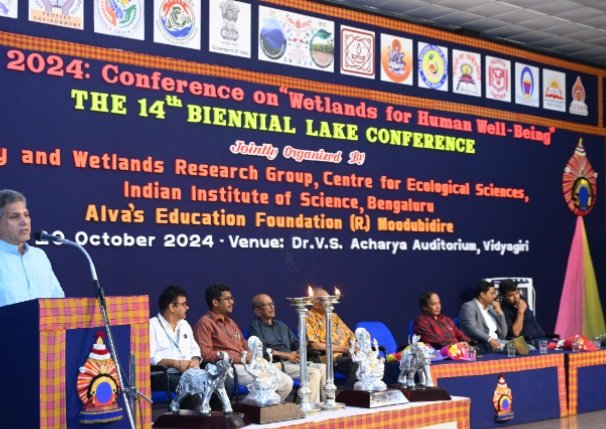
The 14th Biennial Lake Conference, held in Moodbidri from October 17 to 20, 2024, addressed critical ecological concerns under the theme ‘Lake 2024 – Wetlands for Human Wellbeing.’ Organized by the Wetlands Research Group at the Indian Institute of Science in collaboration with Alva’s Education Foundation, the conference highlighted the urgent need for governmental action on the protection of ecologically sensitive areas. The event concluded with a series of strong recommendations aimed at preserving wetlands and enhancing biodiversity for the benefit of human wellbeing.
Ecologically Sensitive Panchayats: A Step Toward Conservation
A key recommendation from the conference was the urgent need for the government to notify ecologically sensitive panchayats under Section 5(1) of the Environment Protection Act of 1986. This move is aimed at promoting conservation practices that are specifically tailored to the unique ecological needs of various regions. By recognizing and protecting these panchayats, the goal is to strengthen ecosystem health through targeted interventions that align with local environmental conditions.
Strengthening Biodiversity Management Committees
The conference shed light on the ineffectiveness of Biodiversity Management Committees (BMCs) formed under the Biodiversity Act of 2002. Most Gram Panchayat BMCs have struggled to perform their roles effectively. To address this, the conference recommended that zilla panchayats take on an oversight role, ensuring that these committees function optimally. By improving the governance and management of local ecosystems, this change is expected to lead to healthier biodiversity and more efficient resource management.
Phased Programme for Ecosystem Improvement
A phased program was proposed, overseen by State Biodiversity Boards, to enhance the implementation of the Biodiversity Act. This approach would enable local committees to better manage and protect biodiversity. One of the standout recommendations was the introduction of a new economic metric, the Gross Ecosystem Product (GEP), to measure nature’s contributions to society. The current reliance on GDP often overlooks the cost of resource depletion and ecological degradation. GEP would provide a more holistic view of the economic value of ecosystems and natural services.
Establishing a Natural Capital Accounting Framework
To integrate ecological benefits into governmental decision-making, the conference called for the establishment of a natural capital accounting framework. This would allow for the development of eco-compensation policies that take ecosystem services into account. The Western Ghats, a crucial water source for the Indian peninsula, were highlighted as a key region in need of effective management to ensure sustainability. Proper accounting of the natural resources in these areas will enable governments to evaluate and manage their ecological assets better.
Adopting a Hydro-Centric Development Approach
A hydro-centric development approach was also emphasized. This approach would prioritize the strict protection of all water bodies and their catchments, ensuring that these critical resources are not compromised by development projects. The conference urged that any intrusive activities potentially damaging to these ecosystems be avoided to maintain the ecological balance essential for human survival.
Formation of a Western Ghats Task Force
One of the central recommendations was the formation of a Western Ghats Task Force in each peninsular Indian state. This task force would work closely with State Biodiversity Boards to ensure the conservation and sustainable use of natural resources. Its focus would be on protecting water and biodiversity while ensuring food and water security across the region.
Local Documentation and Ecosystem Protection
Locality-wise documentation of ecosystems, including water bodies, sacred groves, and myristica swamps, was recommended to better understand the current status of these critical areas. Detailed records of hydrological services, including ongoing and potential contributions, would support better management and protection of natural resources.
A Call for Immediate Action
The 14th Biennial Lake Conference underscored the need for immediate action to protect and manage ecosystems across India. By implementing these recommendations, the conference aimed to not only improve biodiversity but also enhance human wellbeing across the region. The discussions and outcomes from the event serve as a blueprint for sustainable ecological management, advocating for the integration of environmental concerns into governance and development planning.

